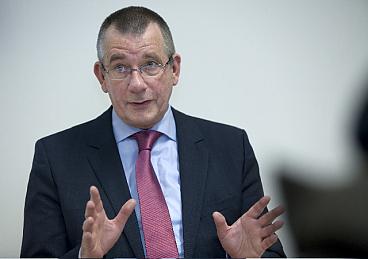De Jong: Too early to draw conclusions over cost of border controls between member states
De Jong: Too early to draw conclusions over cost of border controls between member states

During the last few days a great deal of attention has been paid to a European Parliament study of the economic damage caused by EU internal border controls. SP Euro-MP Dennis de Jong finds this open to question. “The EP study hasn't even been published yet and is only expected in mid-April,” he points out. ”There is indeed a presentation in the Internal Market Committee today, but that's based on a provisional analysis which the researchers base in turn primarily on a paper by the Bertelsmann Foundation. That paper has just come out, but is itself to a great extent based on a World Bank study. That's not all that convincing. When you're calculating the negative economic consequences of border controls, what you base this on is of crucial importance: are there, as with toll-gates, applications of modern technology involved? Are there identity checks alone, or are customs and excise controls also performed? This is all extremely unclear and so it would be better to wait for the definitive study carried out by the European Parliament itself? “.
There are numerous arguments which can be used against the reintroduction of permanent border controls within the European Union. “For example, that refugees won’t really let checks on motorways deter them,” says De Jong. “In the Balkans every more or less passable route was used. That means that people traffickers can only be counteracted if the border controls stretch right across the entire border on a sort of Iron Curtain, but an Iron Curtain between member states. Aside from the enormous costs incurred by that sort of intensive border protection, this would also have negative consequences for regional cooperation between local and regional authorities.”
The Bertelsmann Foundation points to three studies as the basis of its paper, which moreover is only eleven pages in length: a scholarly article from the London-based Centre for Economic Policy Research which dates to 1988, the previously named 1994 World Bank study, and a recent report from French government thinktank France Stratégie. In the case of the 1994 report it must be noted that it assumes that not only controls on people are in place at the border, but also administrative and physical controls on goods in carriage. These would make waiting times correspondingly longer.
The study to be conducted by the European Parliament itself will have to be completely transparent regarding what sort of border control it concerns and will also need to take into account the latest technologies. Lorries carrying goods should be able to pass through a rapid scan as now happens, for example, at Calais. Moreover, a system must be adopted, as has long been urged by Dutch haulage employers’ group Transport en Logistiek Nederland (TLN), under which bona fide firms which take the correct precautionary measures would be exempted from such scans. ´I’d like to see a critical discussion around the usefulness and practicality pf border controls,’ says De Jong, ‘but we need to stop scaremongering which is based in part on hot air,’
- See also:
- Europe
